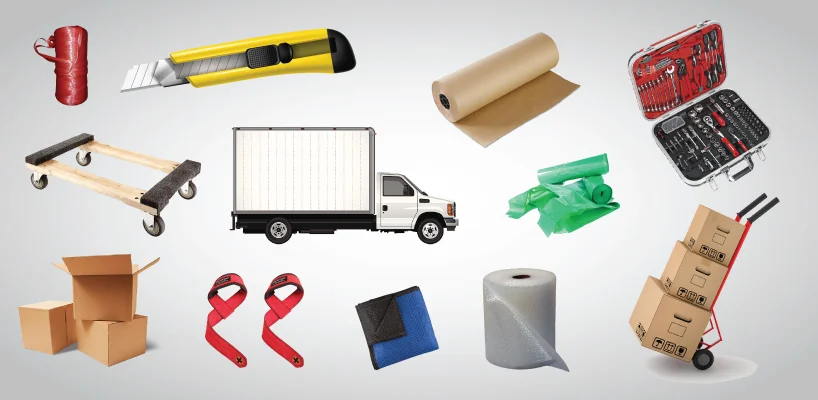The only thing harder than moving is moving without a plan and a good tax deduction.
Moving is one of those experiences where you feel like you're spending money faster than you can blink.
You’ve got the moving company fees, the boxes, gas money for those endless trips back and forth, and hotel stays and meals if you’re moving long-distance.
After all that spending, you start wondering: Can I claim any of these moving expenses on my taxes?
The cost of moving in the U.S. averages $1,400 for a local move and can reach up to $5,000 or more for a long-distance move.
That's a lot of money to spend, especially if you're trying to determine whether moving expenses are tax deductible in 2025.
Taxes can be a nightmare to understand. They're like a maze of rules, forms, and who-knows-what.
But don't sweat it, let’s break it down for you. Are moving expenses tax deductible in 2025? And if they are, who can actually claim it? Are you even eligible? Do you need to be an accountant to figure it out?
Let’s clear up all that confusion and get you the answers you need.
Are Moving Expenses Tax Deductible in 2025?
In the past, if you moved for work, you could write off some of your moving expenses. But then the Tax Cuts and Jobs Act (TCJA) was passed in 2017, and it shook things up for many people.
The TCJA suspended the moving expense deduction for most people starting in 2018 and continuing through 2025. That means, for the most part, you can’t claim moving expenses on your taxes in 2025.
However, there’s an important exception. If you're active-duty military, you can still claim moving expenses, even though the deduction is off-limits for most people.

Feeling taxed by your move? Discover how to move on a budget without sacrificing your sanity or your wallet.
Who Can Still Claim Moving Expenses in 2025?
You’re probably thinking, “Well, that’s not good news for me if I’m not in the military, but who can claim moving expenses then?”
Let’s explain.
As mentioned earlier, the TCJA suspended the moving expense deduction for most taxpayers, meaning you're probably out of luck if you moved for work or any other reason.
But if you’re an active-duty military member, you’re in the clear.
The Military Exception:
- If you’re a member of the U.S. Armed Forces and moving due to a permanent change of station (PCS), you can still deduct moving expenses.
- So, if you’ve received orders to move from one base to another, you can claim all kinds of expenses like transportation costs, storage, travel, and more.

- Active-duty military members: Yes, you can claim moving expenses if your move is due to a permanent change of station.
- Everyone else:Sorry, you’re out of luck unless something changes.
How the Tax Cuts and Jobs Act (TCJA) of 2017 Affects Moving Expenses
The TCJA was a huge tax reform that changed a lot of things, and the moving expense deduction was one of them.
Before 2017, you could deduct a lot of your moving costs if you moved for work. But the TCJA changed that for most taxpayers, and here’s why it matters to you:
Suspension of Deductions: The TCJA suspended the moving expense deduction for everyone except active-duty military members from 2018 to 2025.
No More Work-Related Deductions: If you changed jobs and had to relocate for that, you could no longer deduct the costs of your move, like the movers, packing materials, or travel expenses. It's a tough pill to swallow for anyone who’s had to foot the bill for a big move.
So, the bottom line is that the TCJA made it a lot harder to get a tax break for moving expenses unless you're serving in the military.

Declutter and deduct!Learn how donating clothes before moving can lighten your load and possibly your tax bill.
Moving Expenses Tax Deduction for Active-Duty Military Personnel
If you're active-duty military, here’s how you can still claim those moving expenses:
You Need Orders
You can only claim moving expenses if your move is due to a permanent change of station (PCS). PCS orders mean you're being relocated by the military for an extended period, typically involving a move to a new base.
Deductible Expenses
You can deduct expenses like:
- Packing and transporting your stuff: This includes hiring movers, renting a truck, or shipping your belongings.
- Travel and lodging: Travel expenses for you and your family, including hotel stays along the way.
- Storage fees: If you have to store your things during the transition, those costs can be deducted.
What’s Not Deductible
The deduction doesn’t cover things like meals during travel, non-military-related expenses, or any expenses that the military has already reimbursed.
Employer Reimbursement - What’s the Impact on Your Taxes?
Now, let’s talk about something a lot of people might not know: If your employer reimburses you for moving expenses, you cannot claim those same expenses on your taxes.
Here’s how it works:
1. Reimbursement = Taxable Income: If your employer reimburses you for moving expenses, that money is considered taxable income. It will be added to your gross income and taxed.
2. What Does This Mean?: Basically, you can’t claim the same expenses twice. So if your company covers some moving costs, you won’t be able to use those same costs to lower your tax bill.
However, if you're an active-duty military member, and your employer reimburses you, those reimbursements are generally not taxable.
What Moving Expenses Can Be Deducted in 2025 for Military Members?
If you qualify as active-duty military, here’s a list of deductible moving expenses for 2025:
Transportation Costs: These are the costs related to transporting your household goods, whether through a moving company or by renting a truck.
Storage Costs: Fees for storing your stuff if you need to keep your items in storage before moving into your new location.
Travel Expenses: This includes mileage if you drive, or airfare and lodging costs if you fly to your new location.
Other Costs: Any special moving equipment you might need, like a crane for oversized furniture, can also be deductible.
What Can’t Be Deducted:
- Meals during travel (unless specifically related to your military duties).
- Personal items (if they’re not essential to the move).
What Moving Expenses Cannot Be Deducted?
This is a big one because knowing what you can’t deduct can save you a lot of time and hassle.
For the majority of taxpayers, here’s a list of non-deductible expenses:
Personal Expenses: If you’ve spent money on things unrelated to the move, like buying new furniture for your new place, you can’t write that off.
Meals During Travel: Unless you’re an active-duty military member and it’s related to the move, meal costs along the way aren’t deductible.
Employer Reimbursement: If your company covers your moving costs, you can't deduct those expenses as well. If your employer reimburses you, that amount is taxable.
State-Specific Moving Expense Deductions
Here's something you might not know: state laws differ, and your state might have its own rules when it comes to moving expense deductions.
So even though the federal government isn’t giving you a break, your state might.
Here’s how you can handle it:
Check with Your State’s Tax Agency: Some states might still allow a deduction for moving expenses, even if the federal government doesn’t.
Consult a Tax Pro: Tax laws vary by state, so it’s a good idea to consult with a tax professional or look up your state’s guidelines online.

Check out our moving to a new state checklist to ensure you don't miss a beat—or a deduction.
How to Claim Moving Expenses in 2025
For all the military people out there, here’s how to claim your moving expenses:
Step 1: Get Your Official PCS Orders
Before you can start claiming anything, you need to get your Permanent Change of Station (PCS) orders from the military.
These orders are the official document that shows you're moving for military reasons (i.e., a change in station).
Why it matters: The IRS requires proof that your move is for military reasons, so your PCS orders are your ticket to being eligible for the moving expense deduction.
Where to find it: You should receive your PCS orders from your military branch. Make sure to keep a copy of these orders in case you need to show them later when filing your taxes.
Note: Without your PCS orders, you won’t be able to claim those moving expenses.
Step 2: Fill Out IRS Form 3903
Once you've got your PCS orders, you need to complete IRS Form 3903.
This is the form you’ll use to list all the moving expenses you want to claim.
What’s on Form 3903? On this form, you’ll be listing things like:
- The cost of transporting your household goods (whether you hired movers or rented a truck).
- Travel expenses for you and your family, such as airfare, mileage if you drove, or lodging costs.
- Storage fees if you had to store your belongings while waiting for your new home to be ready.
- Where to find Form 3903? You can get it directly from the IRS website. Here’s the link: IRS Form 3903 (save this for later when you're ready to fill it out).
Step 3: Gather Your Receipts and Documentation
You’ll need to keep proof of all the expenses you’re claiming.
What you need: Gather receipts, invoices, and any other documentation for:
- Moving services: If you hired movers, get the receipts for those services.
- Travel expenses: Keep your hotel bills, gas receipts, or flight tickets.
- Storage fees: If you paid to store your items, make sure you have those receipts too.
Note: The IRS loves receipts. Without them, you can’t prove your expenses, so keep every single receipt related to your move!
Step 4: Include Form 3903 with Your Tax Return
Now that you have Form 3903 filled out and all your receipts in hand, it’s time to get everything ready to file your taxes.
What’s next? You need to attach Form 3903 to your tax return (Form 1040). This tells the IRS exactly how much you’re claiming in moving expenses.
Where to attach it: When you file your Form 1040 (the basic individual tax return form), you’ll attach Form 3903 to it. If you’re filing electronically, you’ll simply upload the form along with your other documents.
Step 5: File Your Taxes and Await Your Refund!
You can file your taxes through the IRS website, use tax preparation software, or hire a tax professional to help you with the process.
Once you file: After everything’s submitted, the IRS will review your forms. If everything checks out, you’ll likely get a refund based on the amount of moving expenses you’ve claimed.
What to expect: Depending on the complexity of your move and the amount of expenses you’re claiming, your refund could be substantial!
Common Mistakes to Avoid When Claiming Moving Expenses
Here are some mistakes to watch out for:
Not Keeping Detailed Records
It's easy to forget, but if you're not saving your receipts for every single expense, you're setting yourself up for failure. Make sure you keep receipts for things like moving services, travel costs, gas, meals, and storage fees. The IRS wants proof of what you’re claiming, so keep your receipts organized. Without them, your claim could be rejected.
Reimbursed Expenses
If your employer already covered some or all of your moving costs, don’t try to claim them on your taxes. If you do, the IRS will disallow those expenses, and you might face penalties.
Forgetting to Include Form 3903
You must attach IRS Form 3903 to your Form 1040 when filing your taxes. If you forget this form, the IRS won’t even consider your moving expense deduction, and you won’t get your refund.
Non-Eligible Expenses
Not every expense related to your move is deductible. You can’t claim things like meals during travel (unless you’re military) or personal items like furniture and decor. Stick to the basics—transportation, storage, and travel expenses for you and your family.
Storage Fees
If you had to store your belongings temporarily during your move, those storage fees are deductible. However, many people forget to claim these fees. Don’t leave them out of your deductions.
Final Thoughts
So, are moving expenses deductible in 2025? For most of us, the answer is no, but for active-duty military members, you can still get some relief.
If you're eligible, you can deduct moving expenses like transportation, storage, and travel costs related to a PCS. And don’t forget to keep receipts and file your taxes with Form 3903.
If you're unsure about any of this, especially about whether your specific situation qualifies, we highly recommend talking to a tax professional to make sure you’re doing it right.

Curious about moving costs?Use our moving cost calculator to get a clear picture of your expenses and plan accordingly.
Recommended Resource
How to Finance Your New Home and Plan Your Move
How to Make an Eco-Friendly Move















































 (239) 799–6077
(239) 799–6077